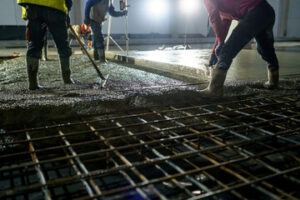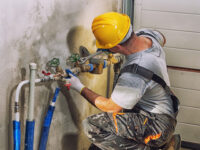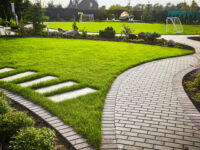Expertise and Innovation in Concrete Contracting
Concrete Contractors play a crucial role in modern construction projects. Their expertise ensures the strength and durability of structures. Proper handling and mixing of concrete are essential for long-term performance. Skilled contractors understand how environmental factors affect curing and setting.
Concrete formulation has advanced significantly over the years. Modern additives improve strength, flexibility, and curing time. Contractors use precise mixing ratios to enhance structural integrity. Consistency in the mixture ensures uniform strength and durability.
Site preparation is essential before concrete pouring. Contractors assess soil conditions and remove debris. Proper grading prevents uneven settling and cracking. A stable base ensures long-term stability of the concrete structure.
Formwork creates the framework for concrete structures. Contractors use wood, metal, or plastic molds. Proper alignment ensures a smooth and even surface. Well-installed formwork supports the weight of wet concrete.
Reinforcement increases the tensile strength of concrete. Steel bars or mesh are embedded before pouring. Reinforcements prevent cracking under pressure. Proper placement of reinforcements enhances structural stability.
Concrete pouring requires precision and timing. Contractors monitor temperature and humidity levels. Proper curing prevents shrinkage and cracks. Controlled pouring ensures even distribution and strength.
Finishing techniques improve the appearance and texture of concrete. Contractors use trowels and brushes to smooth surfaces. Stamped or colored finishes create decorative effects. Proper finishing enhances both aesthetics and durability.
Concrete sealing protects against moisture and stains. Sealants create a protective barrier on the surface. Water-repellent coatings prevent cracking and discoloration. Regular sealing maintains the integrity of the concrete.
Repair and restoration require specialized techniques. Contractors assess damage before recommending solutions. Crack injection fills and seals fractures. Surface grinding restores smoothness and uniformity.
Expansion joints allow concrete to contract and expand. Proper joint placement prevents cracking. Flexible materials fill the joints to absorb movement. Well-designed joints maintain structural integrity.
Concrete demolition requires controlled methods. Contractors use saws and jackhammers to minimize damage. Recycling concrete reduces waste and environmental impact. Proper disposal follows industry regulations and standards.
Concrete resurfacing restores the appearance of worn surfaces. Contractors apply overlays or coatings to refresh the look. Stamped or textured finishes enhance design. Resurfacing extends the lifespan of existing concrete.
Commercial projects require large-scale concrete applications. Contractors handle complex foundations and load-bearing structures. High-performance concrete improves strength and durability. Proper planning ensures compliance with structural requirements.
Residential concrete work includes driveways, patios, and walkways. Contractors tailor designs to match the property’s style. Decorative finishes improve curb appeal. Proper drainage ensures long-term performance.
Concrete flooring offers durability and low maintenance. Polished concrete creates a sleek and modern look. Epoxy coatings improve chemical resistance. Proper installation prevents surface imperfections.
Precast concrete reduces construction time and labor costs. Contractors install precast panels and beams on-site. Precision manufacturing ensures consistent quality. Precast components improve project efficiency.
Concrete countertops provide a custom look for kitchens and bathrooms. Contractors create molds to match design specifications. Sealants protect against stains and water damage. Concrete countertops offer durability and modern appeal.
Concrete stairs require careful planning and installation. Contractors ensure proper riser and tread dimensions. Reinforcements prevent cracking and shifting. Smooth finishing enhances safety and aesthetics.
Concrete walls provide strength and noise reduction. Contractors use reinforced panels for added stability. Decorative finishes enhance the visual appeal. Proper curing prevents cracks and surface defects.
Concrete patios extend outdoor living spaces. Contractors design layouts for proper drainage and support. Stamped finishes create texture and style. Sealing protects against weather damage and fading.
Sidewalk installation requires precise grading and alignment. Contractors ensure even surfaces to prevent tripping hazards. Expansion joints prevent cracking from temperature changes. Durable finishes improve longevity and appearance.
Concrete driveways handle heavy loads and traffic. Contractors use reinforced concrete for added strength. Proper slope directs water runoff away from the structure. Sealing prevents oil stains and surface damage.
Concrete retaining walls prevent soil erosion. Contractors install drainage systems behind the wall. Reinforced concrete withstands pressure from soil movement. Proper design ensures long-term stability.
Concrete foundations support the weight of entire structures. Contractors calculate load requirements and soil conditions. Reinforced footings prevent shifting and settling. Proper curing ensures even strength distribution.
Swimming pool decks require slip-resistant surfaces. Contractors use textured finishes for safety. Proper slope directs water away from the deck. Sealants protect against moisture and chemical exposure.
Concrete bridges handle heavy traffic and environmental stress. Contractors use high-performance concrete for durability. Reinforced supports prevent structural failure. Proper maintenance ensures long-term performance.
Industrial concrete floors withstand heavy machinery and chemicals. Contractors apply epoxy or urethane coatings. Reinforced slabs prevent cracking and wear. Proper installation improves safety and longevity.
Concrete parking lots handle constant vehicle traffic. Contractors install expansion joints to prevent cracking. Drainage systems remove standing water. Regular sealing maintains surface integrity.
Concrete staircases require precise measurements and reinforcements. Contractors use molds for uniform risers and treads. Non-slip finishes improve safety. Reinforced supports prevent movement and cracking.
Concrete curbs define parking and traffic flow. Contractors ensure proper height and alignment. Reinforced curbs withstand vehicle impact. Durable finishes maintain shape and appearance.
Decorative concrete enhances indoor and outdoor spaces. Contractors create patterns and colors through stamping and staining. Polished finishes reflect light and create a sleek look. Decorative techniques improve design flexibility.
Concrete repairs address structural damage and surface wear. Contractors assess the cause of damage before recommending repairs. Crack filling and surface grinding restore integrity. Proper sealing prevents future damage.
Structural concrete supports large-scale building projects. Contractors calculate load capacity and stress factors. Reinforced concrete provides strength and flexibility. Proper installation ensures long-term performance.
Concrete stair treads improve safety and design. Contractors ensure consistent height and depth. Non-slip coatings enhance traction. Reinforced supports prevent shifting and cracking.
Concrete drainage systems manage stormwater and runoff. Contractors install catch basins and channels. Proper slope directs water away from structures. Reinforced concrete prevents erosion and flooding.
Concrete countertops combine strength and design flexibility. Contractors create custom molds for unique shapes and finishes. Sealants protect against stains and water damage. Proper curing ensures durability and performance.
Concrete polishing creates a reflective and durable surface. Contractors use grinding machines to smooth the surface. Polished finishes resist stains and scratches. Regular maintenance preserves shine and texture.
Concrete benches provide durable and stylish seating. Contractors create molds for custom designs. Reinforced concrete resists weather and wear. Smooth finishes enhance comfort and appearance.
Concrete columns provide structural support and design impact. Contractors calculate load capacity and stress factors. Reinforced concrete withstands compression and tension. Decorative finishes improve visual appeal.
Concrete repairs prevent further damage and extend lifespan. Contractors use injection techniques to fill cracks. Surface grinding restores smoothness and consistency. Proper sealing prevents moisture intrusion.
Concrete slabs provide a stable base for structures. Contractors ensure even thickness and reinforcement. Proper curing prevents cracks and surface defects. Sealing protects against moisture and stains.
Concrete work requires precision, planning, and expertise. Skilled contractors ensure structural integrity and performance. Modern techniques improve durability and efficiency. Proper maintenance preserves concrete structures for years.






